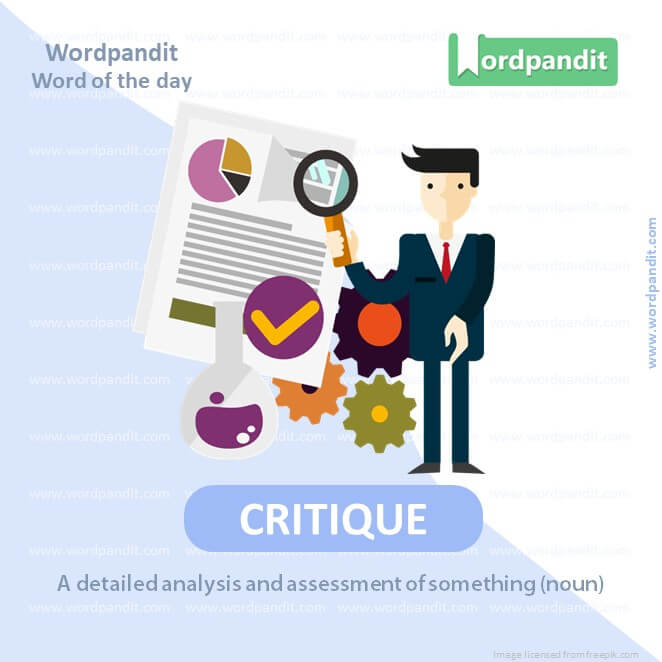Daily Vocabulary Words: List of Daily Used Words in Leading Indian Newspapers
Hi there. Welcome to this special section @ Wordpandit. Our endeavour here is straightforward: highlighting daily vocabulary words that you would come across in leading newspapers in the country. We have included the following newspapers in our selection:
• The Times of India
• The Economic Times
• Hindustan Times
• Mint
• Indian Express
We are putting in extensive work to develop your vocabulary. All you have to do is be regular with this section and check out this post daily. This is your repository of commonly used words; essentially, we are posting a list of daily used words. Hence, this has significant practical application as it teaches you words that are commonly used in leading publications mentioned above.
Visit the website daily to learn words from leading Indian newspapers.

WORD-1: SCEPTICS
CONTEXT: Yet, there remain sceptics. One argument questions the very notion, arguing that Asia is not a natural bloc but more a creation of European geographers.
SOURCE: Times of India
EXPLANATORY PARAGRAPH: Imagine someone who isn’t quickly convinced about stories they hear, like if someone said they saw a unicorn, and this person goes, “Hmm, I’m not so sure.” That person is called a “sceptic.”
MEANING: A person who questions or doubts something (noun).
PRONUNCIATION: SEH-ptiks
SYNONYMS: Doubters, Questioners, Cynics, Nonbelievers, Disbelievers, Challengers, Unbelievers
USAGE EXAMPLE:
1. The scientist faced many sceptics when presenting his new theory.
2. Sceptics often demand more evidence before believing.
3. She was a sceptic until she saw it with her own eyes.
4. He listened to the ghost stories with a sceptic’s ear.

WORD-2: CRITIQUE
CONTEXT: But the more serious critique isolates factors beyond economics. Advocates of this argument say that if the 20th century was the American one, it was not just because of its economy or Hollywood.
SOURCE: Times of India
EXPLANATORY PARAGRAPH: A “critique” is like when someone watches your drawing and gives you tips on how to make it even better. They talk about what’s good and what can be improved.
MEANING: A detailed analysis and assessment of something (noun).
PRONUNCIATION: kri-TEEK
SYNONYMS: Review, Evaluation, Analysis, Assessment, Examination, Appraisal, Commentary
USAGE EXAMPLE:
1. The author appreciated the thoughtful critique of her book.
2. The teacher gave a critique on each student’s project.
3. He wrote a film critique for the local newspaper.
4. Your work will improve with constructive critique.

WORD-3: HEGEMONY
CONTEXT: It represents the hegemony that shaped institutions of global governance.
SOURCE: Times of India
EXPLANATORY PARAGRAPH: Imagine a playground where one kid decides most of the games and rules, and most kids listen to them. In the big world, when one group or country has a lot of control or influence, we call it “hegemony.”
MEANING: Leadership or dominance by one group or country over others (noun).
PRONUNCIATION: huh-JEM-uh-nee
SYNONYMS: Dominance, Leadership, Supremacy, Authority, Control, Command, Influence
USAGE EXAMPLE:
1. The hegemony of the empire was felt across several continents.
2. The country’s economic power gave it a certain hegemony in global affairs.
3. They resisted the hegemony of the dominant culture.
4. Historians often debate the periods of hegemony in ancient civilizations.

WORD-4: BONHOMIE
CONTEXT: It has started on a positive note, with the strengthening bilateral of two important G20 members — host India and the US — reinforced, in recent times, by business deals, defence partnerships and leader-to-leader bonhomie.
SOURCE: Indian Express
EXPLANATORY PARAGRAPH: Have you seen people who are always friendly, smiling, and making everyone feel happy and warm? That cheerful and friendly feeling or behavior is called “bonhomie.”
MEANING: Cheerful friendliness (noun).
PRONUNCIATION: bon-uh-MEE
SYNONYMS: Friendliness, Cheerfulness, Goodwill, Warmth, Cordiality, Geniality, Congeniality
USAGE EXAMPLE:
1. The party was filled with laughter and bonhomie.
2. Everyone appreciated the bonhomie he brought to the team.
3. Holiday gatherings are often occasions of bonhomie.
4. There was an atmosphere of bonhomie among the neighbors at the picnic.

WORD-5: PERSUASIVE
CONTEXT: Strong resistance from private players in the US and Chinese state companies is to be expected — but the value proposition is compelling and persuasive.
SOURCE: Indian Express
EXPLANATORY PARAGRAPH: Imagine you’re trying to convince your friend to trade snacks with you. If you’re good at making them say “yes” with your words, you’re “persuasive.”
MEANING: Good at convincing someone to do or believe something (adjective).
PRONUNCIATION: per-SWAY-siv
SYNONYMS: Convincing, Influential, Compelling, Cogent, Effective, Forceful, Potent
USAGE EXAMPLE:
1. Her persuasive argument convinced us all.
2. It was a persuasive speech that moved the audience.
3. With his persuasive skills, he could sell anything.
4. The article was persuasive in promoting the benefits of a healthy diet.
WORD-6: SATIRE
CONTEXT: The first casualty of the Emergency was Shankar’s Weekly, the country’s best-read political satire magazine.
SOURCE: Indian Express
EXPLANATORY PARAGRAPH: Imagine you watch a funny show that makes fun of something serious to show its silly or bad parts. This kind of funny way of showing what’s wrong or silly about something is called “satire.”
MEANING: The use of humor, irony, or exaggeration to criticize or make fun of something, usually in politics or society (noun).
PRONUNCIATION: SAH-tyre
SYNONYMS: Parody, Irony, Mockery, Caricature, Lampoon, Spoof, Burlesque
USAGE EXAMPLE:
1. The book is a satire on modern politics.
2. “The Simpsons” is known for its sharp satire on American culture.
3. Through satire, comedians often convey strong messages.
4. The play was a biting satire on the contemporary art scene.
WORD-7: BRAINSTORMING
CONTEXT: Psychologists, engineers and advertisers embraced for their own ends. Corporations introduced techniques like ‘brainstorming’, with ‘freewheeling’ sessions where good ideas could be generated by committee.
SOURCE: Times of India
EXPLANATORY PARAGRAPH: Imagine you and your friends sit in a circle and think of as many ideas as you can, like coming up with names for a new pet. This fun way of coming up with lots of ideas together is called “brainstorming.”
MEANING: The process of gathering a group to come up with as many ideas as possible about a specific topic (noun).
PRONUNCIATION: BRAYN-storm-ing
SYNONYMS: Idea generation, Think tank, Group thinking, Collaboration, Conceptualizing, Ideation, Thought shower
USAGE EXAMPLE:
1. The team is brainstorming to come up with a new product name.
2. Brainstorming sessions can lead to innovative solutions.
3. She finds that brainstorming helps in her creative process.
4. They scheduled a brainstorming session for the upcoming project.
WORD-8: GALVANISE
CONTEXT: Guided by the theme of One Earth, One Family, One Future, this week’s summit of G20 leaders in New Delhi will be an opportunity to cement this consensus and galvanise coordinated action.
SOURCE: Times of India
EXPLANATORY PARAGRAPH: Imagine someone shouting “There’s ice cream outside!” and everyone suddenly jumps up and runs to get some. “Galvanise” is like that shout – it makes people suddenly take action because they’re excited or scared.
MEANING: To shock or excite someone into taking action (verb).
PRONUNCIATION: GAL-vuh-nize
SYNONYMS: Energize, Stimulate, Spur, Motivate, Excite, Propel, Ignite
USAGE EXAMPLE:
1. The coach’s speech galvanised the team to play their best.
2. The news galvanised the community into action.
3. The announcement galvanised workers to finish the project on time.
4. They hoped the event would galvanise young voters.
WORD-9: INFALLIBILITY
CONTEXT: Endorsing Jefferson, Ambedkar stated that he was not “putting a seal of finality and infallibility upon this Constitution”.
SOURCE: Indian Express
EXPLANATORY PARAGRAPH: Think of a superhero who never ever makes a mistake, no matter what. That idea of never making a mistake is called “infallibility.”
MEANING: The quality of never making mistakes or being wrong (noun).
PRONUNCIATION: in-fal-li-BIL-i-tee
SYNONYMS: Perfection, Unerringness, Certainty, Reliability, Dependability, Sureness, Flawlessness
USAGE EXAMPLE:
1. The leader spoke with an air of infallibility.
2. Some believe in the infallibility of the scriptures.
3. Her sense of infallibility made her seem arrogant to some.
4. It’s dangerous to assume infallibility in any human.
WORD-10: EXACERBATING
CONTEXT: Such inequalities, environmental damage, and loss of human life and capital are profoundly distressing. As a result, women are negatively impacted, exacerbating the “feminisation of poverty”.
SOURCE: Indian Express
EXPLANATORY PARAGRAPH: Imagine having a tiny scratch and then rubbing it with sand. Ouch! That would make it feel much worse. When something makes a situation or a problem even worse, it’s “exacerbating” it.
MEANING: Making a bad situation or problem worse (verb).
PRONUNCIATION: ex-AS-er-bay-ting
SYNONYMS: Aggravate, Worsen, Intensify, Inflame, Heighten, Magnify, Amplify
USAGE EXAMPLE:
1. His actions are exacerbating the situation.
2. Pollution is exacerbating the global warming crisis.
3. Neglecting the issue is only exacerbating the problem.
4. The recent events are exacerbating tensions in the region.
Vocabulary Meaning and Examples
Immerse yourself in the exciting world of ‘vocabulary meaning and examples’. This concept refers to learning new words, comprehending their meanings, and understanding their usage through real-world examples. Indeed, the ‘vocabulary meaning and examples’ approach can significantly enhance a learner’s language command.
Embarking on the ‘vocabulary meaning and examples’ journey involves starting with a curated list of words. Once you understand a word’s meaning, scour for examples conjuring this word in different contexts. This approach to encompass ‘vocabulary meaning and examples’ allows you to visualize the word’s utility and familiarizes you with its practical usage.
An effective way to learn ‘vocabulary meaning and examples’ is through extensive reading. Reading a variety of materials naturally exposes you to diverse vocabulary implemented in various contexts, helping you gain understanding from real-life examples. Through this method, you interact with both the vocabulary meaning and examples organically, which can boost recognition and recall.
Going beyond passive learning, active usage is essential in mastering ‘vocabulary meaning and examples’. Regularly formulating sentences using the new words reinforces their meaning and provides practical examples which can aid in remembering their usage.
Further, leveraging technology like language learning apps or online language courses can be a significant boon in learning ‘vocabulary meaning and examples’. These platforms usually provide new words, their meanings, and examples on a daily basis, supporting your voyage through language acquisition.
Ultimately, learning ‘vocabulary meaning and examples’ should be a part of your regular routine. A crafted blend of new words, understanding their connotations, exposure through reading and active use can result in an effective approach to mastering ‘vocabulary meaning and examples’, enriching your language proficiency and fluency.













